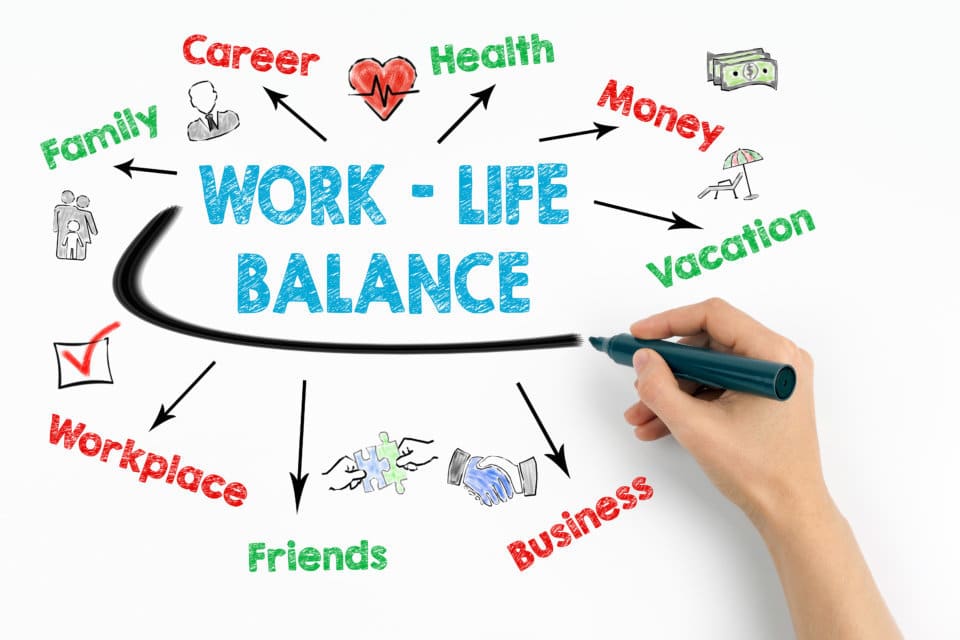The Key to a Fulfilling Life
In today’s fast-paced world, achieving a healthy work-life balance is more important than ever. The constant demands of work, coupled with personal responsibilities, often make it challenging to find time for relaxation, hobbies, and relationships. However, maintaining a balance between professional and personal life is crucial for overall well-being, productivity, and happiness. Without balance, individuals may experience burnout, stress, and dissatisfaction, which can negatively impact both professional performance and personal relationships.
The Importance of Work-Life Balance

- Reduces Stress and Burnout – Overworking can lead to chronic stress and burnout, negatively impacting mental and physical health. Stress can cause sleep disturbances, anxiety, depression, and other health problems. Taking time to unwind and recharge helps maintain energy levels and motivation.
- Enhances Productivity – Contrary to popular belief, working longer hours does not always mean greater productivity. A well-rested mind is more efficient, creative, and focused. Studies have shown that employees who maintain a balanced lifestyle are more engaged and innovative in their work.
- Improves Relationships – Spending quality time with family and friends fosters stronger bonds and emotional well-being. A balanced life allows for meaningful connections and support systems. Poor work-life balance often leads to strained relationships and missed personal milestones.
- Boosts Overall Health – A healthy lifestyle, including exercise, proper sleep, and relaxation, contributes to a stronger immune system and a lower risk of illnesses such as cardiovascular diseases, obesity, and high blood pressure. Emotional well-being is also linked to physical health, making work-life balance essential for longevity and happiness.
- Encourages Personal Growth – Work-life balance provides the opportunity to explore personal interests, develop new skills, and engage in lifelong learning. This, in turn, enhances confidence and fulfillment beyond professional achievements.
Tips to Achieve Work-Life Balance

- Set Boundaries – Establish clear work hours and avoid bringing work-related tasks into personal time. Communicating these boundaries to colleagues and supervisors can help maintain a distinction between work and leisure. Avoid checking emails or taking work calls outside of designated hours.
- Prioritize Tasks – Use time management techniques such as the Eisenhower Matrix (urgent vs. important tasks) or the Pomodoro Technique (work in intervals with breaks) to focus on high-priority tasks and reduce unnecessary workload. This helps in maximizing efficiency and minimizing stress.
- Learn to Say No – Avoid overcommitting to tasks that can overwhelm you. Prioritize tasks that align with your goals and values. Setting limits on work obligations ensures that personal well-being is not sacrificed.
- Take Breaks – Short breaks throughout the workday improve focus and efficiency. Stepping away from work allows for mental rejuvenation. Studies suggest that taking regular breaks, such as a short walk or mindfulness exercises, boosts creativity and problem-solving abilities.
- Engage in Hobbies and Activities – Pursuing hobbies, sports, or creative activities outside of work brings joy and reduces stress. These activities provide a sense of accomplishment and can act as a form of self-care.
- Stay Active and Healthy – Regular physical activity, a balanced diet, and sufficient sleep play a crucial role in maintaining energy and focus. Exercise is not only beneficial for physical health but also for mental clarity and emotional resilience.
- Seek Support – When work pressures become overwhelming, seek support from colleagues, friends, or professionals. Delegation and teamwork can alleviate stress. Additionally, talking to a mentor or coach can provide guidance on managing work-related challenges effectively.
- Utilize Flexible Work Arrangements – Many organizations offer flexible work arrangements such as remote work, flexible hours, or compressed workweeks. Taking advantage of these options can contribute to better work-life balance.
- Unplug from Technology – In the digital age, constant connectivity can blur the line between work and personal life. Setting boundaries on screen time, especially before bed, can improve sleep quality and overall well-being.
- Reflect and Adjust – Work-life balance is not a one-time achievement but an ongoing process. Regularly evaluating one’s lifestyle and making necessary adjustments ensures long-term sustainability and fulfillment.
Conclusion
Work-life balance is essential for maintaining a fulfilling and meaningful life. By setting boundaries, prioritizing personal well-being, and making time for relaxation and relationships, individuals can achieve both professional success and personal happiness. Striving for balance is not about perfect equality but about making conscious choices that promote a sustainable and rewarding lifestyle. Organizations also play a key role in fostering a culture that supports employee well-being, which ultimately leads to a healthier, more engaged workforce. By taking proactive steps, individuals and businesses alike can create an environment where both professional and personal life thrive in harmony.
